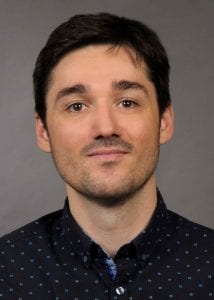Questioning Chemistry Benchmark Sets Stage for New Protocols

Titel Jurca
A little due diligence went a long way for a team of UCF chemists studying a fundamental catalytic reaction used by hundreds of research groups around the world.
Assistant Professor Titel Jurca, Ph.D., and graduate student, Lorianne Shultz, in collaboration with Assistant Professors Melanie Beazley (UCF Chemistry) and Xiaofeng Feng (UCF Physics) published the initial results of their study in ChemCatChem, the flagship catalysis journal of the European Chemical Society, in 2019. Shultz’s diligent work revealed that this commonly accepted benchmarking experiment, often praised for its reliability and commonly used as the first step in determining the most reactive catalyst from a large candidate pool, was in fact unreliable.

Lorianne Shultz
This year, Jurca, Feng, and Shultz followed up on this study with a publication in ChemPhysChem, the flagship physical chemistry journal of the European Chemical Society. In their follow-up, Shultz and coworkers proposed an alternative approach to screening catalysts that offers enhanced reliability, while maintaining the simplicity and efficiency which were the hallmarks of the original process. The work was flagged by the publisher as a “very important paper” and recently covered by Chemistry Views, the magazine of the European Chemical Society.
“The system everyone is using is really inconsistent,” Jurca explained. “Lori was a diligent student and tested that foundational benchmark.”
The benchmark tests and the resulting publication don’t invalidate existing work, but provide an alternative process which may lead to better outcomes in the future.
“I’m sure there are many good catalysts left behind for convenience’s sake,” notes Jurca in reference to inconsistencies in the widely used benchmark, which may mislead researchers into promoting the wrong catalyst candidates.
The next stage of the research will continue to better understand the underlying mechanisms, and improve on the newly developed protocol to further enhance its predictive power.
Jurca is particularly proud of Shultz making her mark as a young scientist through her creativity and curiosity.
“She made a fundamental intellectual contribution to the process instead of just adding more data,” Jurca said.
